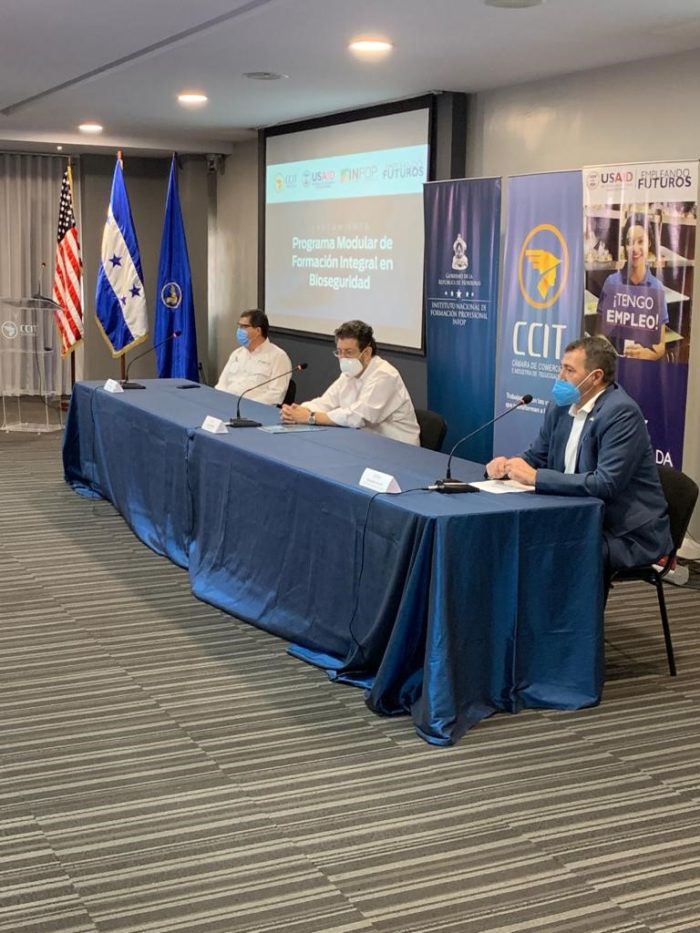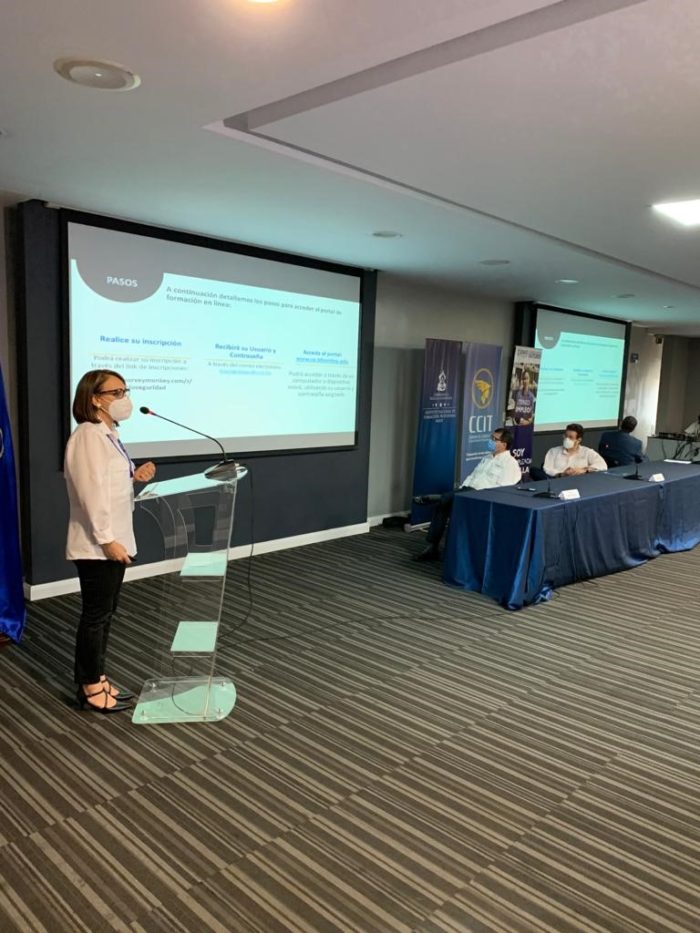Empleando Futuros Launches Biosafety Courses to Help Honduran Workforce Respond to COVID-19
As part of the national response to the COVID-19 pandemic in Honduras, the United States Agency for International Development (USAID)-funded Empleando Futuros (Employing Futures) project worked with the Honduran National Professional Training Institute (INFOP) and nine other government agencies to coordinate the development of a general manual on the basics of biosafety. The manual consolidated scientifically supported biosafety protocols that businesses should follow when given governmental approval to reopen amid the pandemic.
In April 2020, the manual was shared with Honduran government and business agencies. However, Empleando Futuros soon realized that the manual was inaccessible to the general Honduran public, which inspired the creation of an online biosafety course to certify individuals on biosafety protocols for the workplace that could be completed free of charge from the safety of one’s home.
Empleando Futuros led the development of the course, titled “Basic Biosafety Norms,” with the cooperation of nine private sector chambers, associations, and foundations; representatives of 60 businesses; and official certification by INFOP. The eight-hour, three-module course covers basic biosafety knowledge and the practices that should be implemented in homes and the workplace. After completion, the course was uploaded to INFOP’s website and the websites of other large workforce development agencies, such as the Chamber of Commerce and Industries of Tegucigalpa (CCIT), the Federation of the Chamber of Commerce and Industries of Honduras (Fedecamaras), and the National Association of Industries (ANDI).
The response to the online course has been overwhelmingly positive, with more than 11,000 Hondurans signing up to receive the certification. More online biosafety courses and platforms are now in development to meet the high demand. Biosafety courses that focus on specific industries, such as construction, and specific populations, such as employees with disabilities, are also in development, as is a course specifically for schools and educators.
On May 29, CCIT and Empleando Futuros held a press conference in Tegucigalpa to announce the launch of the course on CCIT’s online platform. The press conference was led by prominent government and business figures such as CCIT President Jose Luis Rivera, CCIT General Manager Carla Ruiz, INFOP Director Roberto Cardona, and USAID/Honduras Director Fernando Cossich. This was Mr. Cossich’s first public appearance since the government of Honduras announced the implementation of a national quarantine to mitigate the spread of COVID-19 throughout the country. At the conference, Mr. Cossich expressed his gratitude to USAID for their participation in the endeavor: “In one way or another, the bonds between brother nations are manifested. As the government of the United States reaches out again, we continue doing what we have always done: working with brother nations to provide the opportunity to develop.”

From left to right, Mr. Cardona, Mr. Rivera, and Mr. Cossich attend the press conference on May 29.
Throughout the press conference, each speaker addressed the limited number of reports on the significance of the online course, their concern for public health, and their expectations for both Honduras’ economic revitalization and its relationship with the U.S. through USAID. A highlight of the conference was a testimony to the accessibility and success of the online course by an employee that works at Teleton, a Honduran company that focuses on helping people with disabilities. The employee, Leslie Solorzan, stated, “We are 273 employees [from Teleton] using the [online] platform, and this program definitely meets objectives and allows us to see biosecurity measures in a friendly way for our new way of living. What we liked the most is that we were able to understand it comprehensively, as the [course] is quite [easy] to adapt to the different positions in a company, from a motorist to a top executive.”
Ms. Ruiz further explained the importance of the course: “The advantage of these alliances with USAID and INFOP is to guarantee that this training action complies with a formal education structure and that it incorporates elements in a way that provides technical support. Behind this platform will be biosafety technicians and professional training support attending to any inquiries.” Mr. Rivera echoed her statement by simply saying, “Saving employment will save lives.”

On June 2, ANDI launched the course on its virtual platforms as well. The ANDI launch was conducted as part of their national board meeting with the participation of over 40 leaders from top Honduran companies, including Walmart, Central de Ingenios, Tabacalera Hondureña, Químicas Handel de Centro America, Cerveceria Hondureña, Panadería Bambino, and Banco Atlántida. The Director of USAID’s Education Development Office, Mariella Ruiz-Rodriguez, spoke about the importance of the course as a means of saving lives, companies, and jobs, and she congratulated ANDI for their cooperation and commitment to the process. Empleando Futuros’ Chief of Party, Paul Teeple, spoke about the importance of everyone completing the training and applying it in the workplace and surrounding areas. Through ANDI, the course is expected to reach between 2,000–3,000 people in the coming days. This week, the Central de Ingenios sugar company announced their plans to immediately require completion of the course for their 400 employees. As of June 4, over 11,000 people had signed up to take the course through INFOP alone.
Many Honduran companies have suffered from the economic ramifications of COVID-19. The new online biosafety courses will not only certify thousands of Honduran citizens on how to safely return to work and adhere to approved biosafety protocols, but will also foster the skills and motivation needed to reactivate the economy once it is possible to safely do so.
